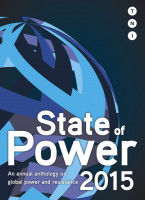Communities of Resistance: Resistance is not futile Understanding how neo-liberalism can be challenged by common and reciprocal action
Despite the pervasive strength of neoliberalism, activist practices including community organising, reciprocal working, commoning and conviviality are building spaces for relationships and learning and showing that resistance is not futile.

Authors
Abstract
How can we build resistance and alternatives to the current political orthodoxy? The neo- liberal regime is becoming pervasive in the North and South. It seeks to privatise public goods and common land, outsource welfare services and introduce competitiveness deeper into our lives. Citizenship and rights become challenged and conditional. This regime’s power is embedded in structures of trade and governance, which make local opposition difficult.
Civil society organisations can resist but the spaces are becoming smaller. But this essay argues that ‘resistance is not futile’ and provides examples from the South and North. Activist practices including: community organising, reciprocal working, commoning and conviviality can build spaces for relationships and learning. They offer ways of doing and thinking differently. This essay points out that even here there are attempts at colonisation by the dominant regime and argues for a strong defence of the social commons.
Introduction
How can we build resistance and alternatives to the current political orthodoxy? At times it seems that neo-liberalism is the only game in town: you can choose any political and economic system you like - as long as it’s neo-liberal. This analysis is vital for discerning the structures holding the edifice in place. But the danger is that we accept the mental cage it implies: that there is no alternative. So this essay looks in another direction.
It considers possible sites where full colonisation by neo-liberalism has not yet taken place. We consider the practices of community organising, reciprocal working, commoning and conviviality in the South and the North. These may represent innocent holes, perforations, or disjunctures in the neo-liberal regime. On their own they may present no serious threat, however, they provide counter examples at a micro level of different ways of thinking and learning and alternative ways of doing. These practices are often taking place in – but also around the edge of – formal civil society organisations.
Taken together they represent the ‘social commons’ – which contains an enormous resource of tangible processes and intangible inspiration. There have even been, unsurprisingly, attempts to wire the activities within this realm into the neo-liberal circuit. This essay alerts us to the importance of these spheres, points to where they are under attack, and how this may be resisted.
